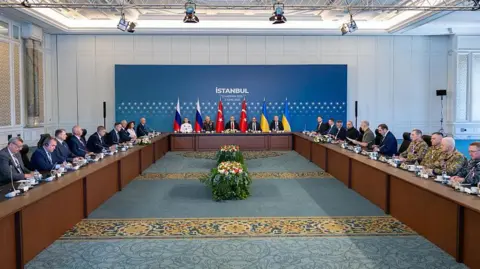The ongoing conflict between Russia and Ukraine remains a poignant issue, exemplified by the recent second round of peace talks held in Istanbul. As reported, these discussions wrapped up without achieving a significant resolution beyond an agreement to swap prisoners of war. The negotiations, which took place mere hours ago, reveal the continued impasse as both sides fail to come to terms on a ceasefire, a primary objective for Ukraine and its allies in the United States and Europe.
Ukrainian representatives expressed their disappointment, stating that Russia once again rejected an “unconditional ceasefire.” This demand has been consistently articulated by Kyiv, seeking a cessation of hostilities amid the protracted violence that erupted following Russia’s full-scale invasion of Ukraine in February 2022. Despite the lack of a ceasefire agreement, both parties did commit to returning the remains of approximately 12,000 soldiers, a move signaling at least some degree of cooperation amid ongoing tensions.
During the talks, the Russian delegation proposed a temporary truce lasting two to three days in certain areas of the frontline. However, no specific details were provided regarding the locations or conditions for this proposed ceasefire. Meanwhile, the discussions only lasted over an hour, reflecting perhaps both parties’ low expectations heading into the meeting. Notably, Moscow currently controls about 20% of Ukrainian territory, including Crimea, which it annexed in 2014, reflecting the ongoing territorial disputes that have complicated the peace process.
The talks were led by Ukrainian Defence Minister Rustem Umerov, who emphasized the necessity of a “full and unconditional ceasefire” for a period of at least 30 days, covering land, sea, and air operations to stem the ongoing violence. Umerov indicated that Ukraine had submitted its ceasefire proposals to Russia a few days prior to the meeting, underscoring a lack of reciprocation from the Russian side, which only revealed its proposals during the negotiations in Istanbul.
Although specifics of both ceasefire proposals remain undisclosed, Russian media has reported on their key points after the conclusion of the talks. The demands from Moscow include the withdrawal of Ukrainian military forces from four regions—Donetsk, Luhansk, Kherson, and Zaporizhzhia—that it partially occupies, along with the requirement for international recognition of these territories as part of Russia.
Furthermore, Russia’s conditions also encompass restrictions on Ukraine’s military alliances, a limitation on the size of its armed forces, the establishment of Russian as an official language, and the lifting of international sanctions imposed on Russia. Ukrainian Deputy Foreign Minister Serhiy Kyslytsia noted that these demands were indicative of Russia’s refusal to concede to the notion of an unconditional ceasefire.
The current situation is compounded by reports from Ukraine that detail hundreds of children allegedly taken to Russia forcibly. Ukrainian negotiators are awaiting a response to their proposals and are keen on preparing for potential direct talks between Ukrainian President Volodymyr Zelensky and Russian President Vladimir Putin. However, significant barriers remain, with no visible progress reported toward arranging a meeting between the two leaders.
Amid this backdrop, the Russian delegation, led by Vladimir Medinsky, confirmed that there would be exchanges of sick and heavily injured prisoners of war, as well as those under the age of 25. Additionally, it was disclosed that Russia would return the bodies of 6,000 Ukrainian soldiers to Kyiv, although Zelensky later confirmed a reciprocal return of Russian soldier remains without a specified timeline.
In a broader context, the lack of an unconditional ceasefire has led to frustrations, with Zelensky emphasizing the importance of ongoing defense strategies and the imposition of further sanctions against Russia. The geopolitical landscape continues to shift, influenced by statements from international figures, including US President Donald Trump, who, despite urging for a swift resolution, has been criticized for delaying tougher sanctions against Russia.
The first round of direct peace talks that occurred on May 16 was similarly unproductive, underscoring the lack of consensus and mutual distrust plaguing the negotiations. Throughout these tense discussions, the overarching issue remains: a war that has caused significant human loss and territorial disruption persists, with little hope for an immediate resolution in sight.



